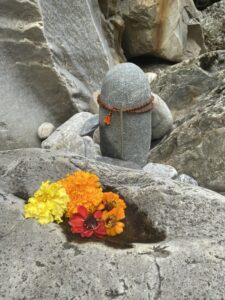I have been reluctant to write about my personal experiences for this newsletter. I want this to be about yoga, not about me. In the last issue, however, I wrote about some of my time with my teachers and lessons I had learned. I got a good deal of positive feedback and requests for more of the same. So, with the hope that nothing you’ll read sounds like a personal horn being tooted, here’s a couple more experiences and lessons learned.
The Ram Bomb
Neem Karoli Baba was a great yogi who has had an immeasurable influence on the spread of yoga from India to the West. The extent of his involvement on the Western yoga movement will never be fully known as he was so adverse to fame and personal publicity. Also known as Maharaji (literally, “great king,” but commonly used as a title, like, “sir”), Neem Karoli Baba was a great exponent of the power of the repetition of the simple mantra, “Ram” (rhymes with “mom”). The Ram mantra is an easy and wonderful way to develop compassion within oneself and spread positive vibrations to others. I was introduced to the Ram mantra by Maharaji and have worked with it for some 30 years.
Neem Karoli Baba died on September 11, 1973. The teachings of this great man of love are a stark contrast to the beliefs that later brought forth the events of September 11, 2001. Same calendar date, completely divergent thought systems. I have come to believe that humanity has reached a crossroads, and these two events are reflections of our possible futures. We can follow the teachings of the sages to love and serve one another, or we can hate and try to destroy each other. The paths diverge, we must choose. Will it be “Ram or the bomb?”
One of the most remarkable things about Neem Karoli Baba is his teaching style. Rather than speak about something at length, he would offer a few words, then seemingly instigate a situation so the individual would find out for himself the validity of the teaching. I have witnessed this so often that it no longer even seems odd, or miraculous. I feel like I once had a taste of both Maharaji’s unique teaching style, as well as the power of the Ram mantra.
Last Spring, I had lead a workshop at the Ananda Ashram in Monroe, N.Y., and was traveling home to Middlebury via the New York Northway. I was in the car with my good friends, Shivani and Barsani dasi, both young women in their 20s. At one point we were talking about Neem Karoli Baba. I was expressing my disappointment at the way some of his devotees had behaved in the past couple of years. I held that they had acted in ways in which I judged were conceited. I felt they were trying to make themselves rich and famous by presenting yoga in a commercial manner, often using Maharaji to bolster their position as teachers. I found this upsetting because Maharaji was well-known for avoiding the superficial and for generously sharing everything without concern for fame or fortune.
My being upset, of course, had nothing to do with anyone else’s behavior. It was my own reaction, and it certainly didn’t have anything to do with Maharaji, any more than we should blame Jesus for the fake preachers on late-night television. I guess I needed someone to blame, though, so I declared that my faith in Maharaji and, by relation, the Ram mantra, had been diminishing.
After driving a bit more, the three of us stopped for a bathroom break at one of the rest areas. It was a dark night, and the rest area was seemingly deserted. We were the only car in the lot. The men’s and women’s bathrooms were separated by a thick cement wall. I was in the men’s room taking care of business when I heard Shivani and Barsani dasi screaming from the women’s room.
Their cries, muffled somewhat by the wall, terrified me. All I could hear was their shrieking, “No! Stop!” I had the fleeting thought that they were being assaulted. Adrenalin shot through my system. My reaction must have bypassed because if I had stopped to think I would have been paralyzed with fear. Instead, I ran to the women’s room, swung open the door, charged in, and with fists clenched I roared as loud as I could, “Ram!”
When I raged into the women’s room, I found no assailant to fight. Turned out the screaming was due to a malfunction in the toilets resulting in streams of water shooting up from the bowl onto the ladies’ butts! Anticlimactic, for sure, but I was tremendously relieved. I had really been frightened to my core, thinking I was entering some violent situation. It took a bit for my heart to stop pounding. The girls were very sweet, apologizing for upsetting me, and praising me for my almost heroism. I was not up for the praise, though, because the goal of yoga practice is not to be courageous, but to be fearless. Fearless, believe me, I was not.
What was most astonishing to me was how my mind knew where to turn when the proverbial stuff hit the fan. My spontaneously calling out the Ram mantra was not the result of calculation or any rational process. It came from a place of raw emotion, because I had grown to trust the mantra and the great sages who have professed its benefits. I didn’t even realize I would rely on the mantra until confronted with this event. It is comforting to me, now, to know the mantra has taken root in me. I believe it will be there for me as a support and comfort in any dramatic life situation, including the transition of death. Finally, considering the absurdity of the way I learned this lesson, I can’t help wondering if there was not a mischievous finger in pie of the situation, a finger on the hand of the giggling Neem Karoli Baba.
The Bhava of Friendship
In yoga, everyone is welocme to develop their own bhava, or mood, for how they will relate to the Divine and to other people. There are numerous bhavas, which you can find described in the Narada Bhakti Sutras. I have found that what works for me is the sakhya bhava, the mood of friendship. This is a way of relating to others as a friend.
The mood of friendship enables me to be happy a lot of the time because I am always with friends. If others return my friendship, that is terrific. If they are cold, or even antagonistic to me, that is their prerogative, but I try and still feel I am their friend. This makes it easy to forgive, because friends forgive one another. Plus, I tend to feel comfortable with most people because, being friends, we are equal. The intimacy of friendship can only take place between equals. In the bhava of friendship there is no sense of someone being greater and another lesser.
There is a fairly well-known yogini, known as Ammachi, who travels around the world teaching the yoga dharma (path of yoga). She is known as “The Hugging Saint,” because she offers everyone who comes to see her a hug. Her organization reports that she has hugged several million people over the past 20 years or so. She presents the vatsalya bhava , the mood of parenthood. She relates to others with the love of a mother towards her children. Ambika and I once went to one of her programs and saw her stay up all night hugging literally thousands of people. She hugged everyone for just a few seconds but, still, it was impressive on her part.
What was not quite so impressive was the environment around her. Like many guru scenes, the people were happy to fawn over the teacher but were less kind to one another. I have always found this distasteful, it reminds me of a celebrity circus. I enjoy myself most in situations where people are not focused on any one individual but are sharing equally with each other. Around Ammachi, I found too many people fighting for scraps of her time and attention while willing to ignore the needs of those who did not hold the same spiritual status in their eyes.
When Ambika and I went to meet Ammachi, Jahnu, our son, was about one and one-half years old. Our turn to embrace her came, and Jahnu was asleep. We went to Ammachi, and while she was hugging Jahnu she was apparently distracted because she began to talk to someone else and laugh loudly. This woke Jahnu up and he began to cry. Ammachi seemed oblivious to Jahnu’s discomfort and did nothing to help calm him. Ambika and I were able to soothe our boy, but I was none too happy with the way Ammachi had related to him.
Ambika, Jahnu, and I returned to the room in which we were staying. Ambika and Jahnu went to sleep but I stayed up for a while contemplating what had occurred. I recognized I was angry that Ammachi had seemingly treated Jahnu uncaringly, causing him to wake and cry. I decided I would go back the next day and tell her what I thought.
The next morning, over breakfast, I told some people I was angry at Ammachi and was going to tell her how I felt. Their response reinforced my negative impressions. They seemed to think my anger was completely unjustified and that my feelings were practically blasphemous (because one is not, I guess, supposed to get angry in such a “spiritual” environment). In addition, I was told, I should forget the whole thing because Ammachi is a “perfect master” and was likely performing some sort of mystical ceremony by waking Jahnu and making him cry.
Perhaps Ammachi was practicing an esoteric ritual with Jahnu, but I couldn’t perceive it. My personal vision, based on my own subjective fallibility, was that she just wasn’t paying enough attention in a sensitive situation. This was my story and I was sticking to it. Plus, being that I practice the mood of friendship, I believed that it was fine for me to tell my friend, Ammachi, that I was pissed-off at her. Plus, since she embraces the mood of motherly love, I assumed she would be fine with her child speaking to her honestly. This is how yogis relate to each other, integrating their different bhavas with love and respect.
Ambika, Jahnu and I got in the line to again meet with Ammachi. There were several thousand people in the hall. When we were the next to go to her, about 10 feet or so away, there was a big commotion and interruption. It turned out that there was a group of people from Montreal who had written a song to Ammachi and were going to sing it in French.
It took about 15 minutes or so for them to sing. Besides the singers and the crowd on the periphery, it was Ammachi, Ambika, me and Jahnu. We three adults kept looking at each other and smiling, as the whole situation had the ring of the sweet but silly, since none of us knew French but could sense the tender intentions of the singers. Ammachi would look at us, shrug her shoulders and smile, as if saying, “This is my life, I’m trying to do a good thing, I’m doing the best I can . Sometimes I even have to listen to songs I can’t understand sung by people I don’t know.” We shared an intimate time, acknowledging each other as spiritual beings on the wild and crazy path we call yoga.
By the time the singing had concluded, I no longer felt the need to speak with Ammachi about her behavior the night before. She is my friend, after all, and I could appreciate all the good she does for others. If she didn’t perform 100% to my satisfaction, well, friends don’t have to be perfect.
The clincher of the whole deal, however, was the reaction of those who were upset with my initial feelings of anger and desire to communicate. They were definitely amazed, and more than a bit jealous, that our family got to spend so much time with Ammachi, while the thousands of others only got a brief hug. I also got the sense they were disappointed that something bad hadn’t happened to me since I had dared to be angry with the supposedly perfect guru. It didn’t seem fair to them that we got the sought-after prize of attention from the guru, especially since we were not star struck to begin with. They looked at us like we unfairly won the lottery even though we didn’t buy a ticket.
Our experience with Ammachi confirmed for me the beauty and power of the mood of friendship, and of having a willingness to honestly communicate with others, no matter who they might be. Others may want to place their spiritual teachers, sports stars, movie actors and other celebrities up on pedestals. That’s fine with me. I am, however, very content to enjoy the bhava of loving friendship between respectful equals, and the light-hearted good humor that friends can share.
Ahimsa
The foundation principal of yogic life is the practice of ahimsa. Often translated as “non-violence,” this term does not do justice to the profundity of ahimsa. Ahimsa does not mean one is to be passive, nor is one to allow oneself to be harmed. My yoga guru, Baba Hari Dass, taught very specifically, “Self-defense is everyone’s right.”
Yogis are not pacifists. We often turn the other cheek if an attack is made on us personally, but we will not permit harm to be done to another. If this involves using physical force to protect the weak or innocent, so be it. We are slow to unsheathe the sword, but once unsheathed we use it with great potency. Ultimately, though, the goal of ahimsa is to find a way to de-escalate negative energy so conflicts do not result in violence.
I had an experience in the power of ahimsa one time when I attended a Grateful Dead concert in the early 1990s. I was walking around the stadium prior to the concert doing the kinds of things one does while waiting for the Dead to do the kinds of things they do. It was all pretty darn good-natured and gentle, until I came upon a really horrific situation.
A middle-aged security guy, whose job apparently was to take tickets and help people find their seats, was being accosted by some maniac. A young man with his shirt off, revealing a weightlifter’s torso, was yelling and spitting curses into the older guys face. The guard was petrified, actually shaking, as the dude kept swearing he was going to tear his head off, blah, blah, blah. The more scared the older man got, the more the idiot delighted in his aggressiveness.
There was a group of people watching this scene. Like the others, I would have preferred to avoid getting involved. It didn’t look like much fun to try and stop the ensuing slaughter. Because of my vow of ahimsa, however, I was forced to intervene. The trick was to figure out some way to stop the fight without drawing the negative energy onto myself. In other words, how the hell was I going to get the nut away from the security guard without getting myself beat up in the process?
Saying a quick prayer and relying more on grace than intelligence, I walked between the two of them. “Hey,” I said, good and loud, “Do you know where my seat is?” I shoved the ticket towards the yelling fool. Taken by surprise, he squinted and tried to figure out where I was sitting. “Um, I think it’s down there,” he said pointing. “Ask him,” he added, referring to the security guard.
The guard was just happy to have some relief from the violence. He looked at my ticket and directed me to the proper seat. I walked between the two of them yelling, “Thanks, guys!”
I walked down a few rows and looked behind me. The break in the action had defused some of the yelling. The younger guy was still in a rage but his voice wasn’t quite so loud and cruel. I walked back up the steps, between them again, sharing “I gotta’ go piss.” Once again, the negative mojo was interrupted. On my return from the imagined urination run, I again sauntered between them, “Hey guys, ‘scuse me again, sorry to get in the way, you know how it is, wonder when the music starts ….” At this point, the maniac had spent his fuel. With one final grand, “fuck you” aimed at the guard, he strode off.
The poor security guard was shaken. His skin was ashen and he was visibly sweating. One could understand why, it seemed he was destined to be beaten up by a young fool with something to prove. I asked him if he was alright, and he nodded affirmatively. He seemed to recognize the effort I had made on his part because he offered me his thanks. “Thank you, thank you” he said, again and again, “thank you very much.”
He concluded by telling me, “The world would be a better place if there were more people like you.” I turned to a girl standing next to me and said, “The world must really be in bad shape if it’s people like me gotta’ get it better.” We all laughed.
I thought I was just going to a rock concert. All I had planned on was good music and fun times. I hadn’t expected to be shown the power of ahimsa but, I guess, a yogi should always be ready to learn in any environment. Plus, it really began to dawn on me that the world will become a better place if ordinary people like us make the effort.
A short time later the concert began and a fine time was had by all. I went home that night tired and happy, acknowledging that once in a while you can get shown the light in the strangest of places if you look at it right.
Showing Off
It is said that on the spiritual path there are three requirements for progress – humility, humility, and humility. It is also said that everyone wants humility but no one wants to go through the experiences it takes to become genuinely humble. I know my personal experience has been that I generally only learn about humility through hard knocks.
At one time Ambika and I were traveling around the West Coast. We stopped in Portland, Oregon to stay with a good friend. While visiting, I decided to check out a yoga place on the corner near his house.
You know how people saunter into our yoga classes, wearing whatever happens to be mostly clean, and then class often starts late because of all the chatting? Well, believe it or not, as I have traveled around the country visiting yoga centers I have found this pleasantness to be the exception rather than the rule. The Portland class, for instance, filled up quickly with people wearing fancy yoga clothes just about worth more than my old truck. They rolled out their personal yoga mats and avoided contact with each other. I know these were urban folks but, still, it was more like they were waiting for a subway car than getting together to share a yoga class.
Things only got worse, in my not-so-humble opinion, when the teacher strode in and got things started. Without much ado, I judged her as being conceited and obnoxious. Regardless of what she did or did not do, my negativity soon lead to my own problems.
The teacher demonstrated a yoga posture and I, deciding I would teach her what I concluded she needed to know, went into a more advanced variation than she could perform. “Show her what’s really going on,” I righteously chuckled to myself. Well, my inner laughter subsided pretty darn quick when my knee made a “pop” sound, and a searing pain shot through my right leg. Pride knows no limits, though, and I bit my lip and made it to the end of class.
The next day my knee was in bad shape. I couldn’t really bend it and it was impossible for me to sit in a meditation posture. To make a long story short, the pain and inflexibility lasted about a full year. I was increasingly frustrated and depressed, wondering if I would ever be able to bend my knee again. Sitting in a chair for meditation was less conducive to my practice and knocked my pride down a whole bunch of rungs. I tried everything to heal the knee and nothing worked.
While this was going on, Ambika had become friendly with a woman who lived in the State of Washington. They both practiced Reiki, a form of energetic healing. Ambika shared with her friend my problem with my knee. The woman e-mailed Ambika that she would send me a distant Reiki treatment, whereby she would mentally send me healing energy. I am not one who usually responds to Reiki or other energy work, and I am as critical as can be when it comes to anything resembling a psychic phenomenon. All I know is that the morning after the treatment the pain in my knee was gone and has never returned. I was so very grateful.
Since the injury to my knee, I have easily avoided any temptation to use yoga as a means for strutting my stuff. The painful results are just not worth it. I also think the moral of the story is that when I am tempted to judge another, I am treading on dangerous ground. The thought “I’ll show them,” seems to be the predecessor to the karmic whip-cream pie in the face.




